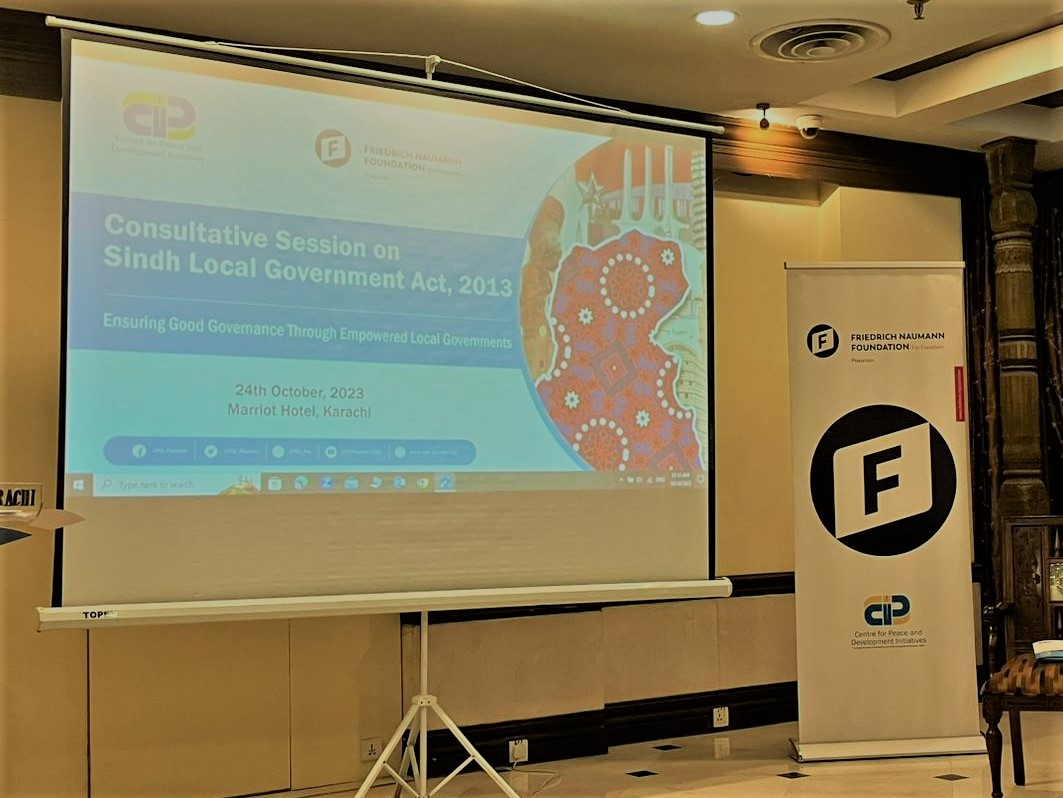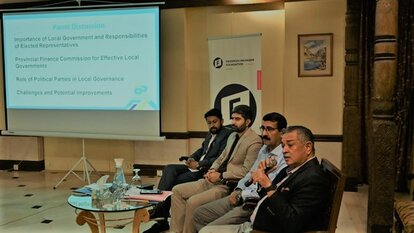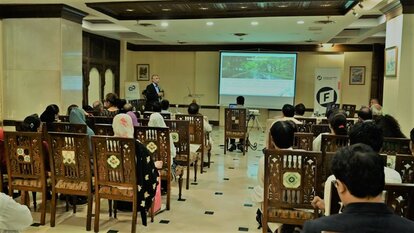Pakistan
Empowering Local Governments

FNF CPDI Consultative Session Sindh Local Government Act 2013, October, Karachi
© CPDI/ FNF Pakistan“If local governments are practically given more power, it means anyone can find solutions to local problems right in their neighborhood, instead of having to go to the Chief Minister or other provincial authorities" as explained by Arshad Vohra, former deputy mayor and ex-member of the Provincial Assembly (MPA) during a consultative session on Sindh Local Government Act, 2013.
He further identified the need to change Article 140-A of the constitution, which currently only covers local government elections and doesn't explain the powers local governments should have. Talking about the elections (of local government) at regular intervals and role of judiciary he further stated ," It is unjust that the Supreme Court of Pakistan hears practically all cases except those involving local governments, elections, and other issues. We are advocating for genuine public representation through free and fair municipal elections. It is time to provide local governments the authority they require to adequately serve their communities.”
He noted that during previous terms of local governments, most of the decision-making power stayed with provincial governments. This means that for even small matters, people had to contact the provincial administration. This doesn't align with the spirit of local governments, where local issues should be handled locally.

"Local residents and elected representatives from the local level are the ones who know the local issues best and can deal with them effectively by setting priorities" Arshad Vohra former Deputy Mayor Karachi, CPDI, October 2023
© CPDI/ FNF PakistanDuring the consultative session stakeholders from various backgrounds came together to reflect upon the intricacies and challenges surrounding local governance in Pakistan. Elected representatives, members of civil society, media professionals, local government experts, government officials, and representatives from local government training institutes converged in a pivotal dialogue forum, where they shared insights and concerns regarding the current state of local governments in the country.
- Mr. Zahid Hussain Khawaja -Director of Revenue and HR at Karachi Metropolitan Corporation- pointed out that political interference has hindered the effectiveness of local governments in Pakistan. He stressed the need for a functional Council of Common Interests (CCI) with well-defined rules, a consistent National Finance Commission (NFC) Award underpinned by subordinate legislation, and the devolution of political, financial, and administrative authority to empower local governments.
- Mr. Ahmed Hussain Mahar -an official from the Planning and Development Department of Sindh- highlighted the challenges posed by sudden changes in policy-making at the upper level. He stressed that these changes create hurdles in planning and hinder the ability of local government representatives to execute development schemes effectively.
- Advocate S. A. Younas -a City Councilor representing Jamat-E-Islami- strongly advocated for the allocation of more powers to local governments to effectively serve their communities. He underscored the importance of viewing political parties’ not just as public representatives but as proactive participants in Local Government elections.
- Khalique Rehman Shaikh-Director of Human Resources Management at KMC- emphasized the need for proper orientations on the Local Government Act to empower local government representatives. He argued that elected representatives often lack awareness of their roles and functions, which leaves them powerless and directionless.
These testimonials echo a common theme: the need for empowering local governments to enhance their effectiveness in addressing local issues, ensuring transparency, and promoting genuine public representation.
Local Government System often feels ineffective when we are in the opposition, as our requests go unanswered
Institutionalizing climate action within local government
During the second session of the event, Mr. Moazzam Ali Janjua delivered a comprehensive presentation that delved into the intricacies of integrating climate action within the framework of local governance. His presentation not only highlighted the current state of climate-related initiatives but also laid out a roadmap for the future, offering a clear direction for further development.
Mr. Janjua's overview encompassed a wide range of key aspects, like current climate change challenges, policy frameworks, local initiatives, community collaborations, and resource utilization. Overall, a comprehensive overview of climate action integration within local governance aimed to inform and inspire attendees about the importance of addressing climate change at the local level and provided a strategic plan for the path forward.

Moazzam Ali Janjua, CPDI, giving overview of climate action integration within local governance
© CPDI/ FNF PakistanWay Forward
The following recommendations were identified:
- Empowering Local Governments: Participants called for a constitutional amendment to empower local governments, ensuring that they have the necessary authority to address local issues effectively.
- Transparency in Revenue Generation: It was emphasized that local governments must have transparent revenue generation mechanisms to efficiently utilize resources and funds collected at the local level.
- Orientation for Elected Representatives: Local government representatives need proper orientations on the Local Government Act to understand their roles and responsibilities, ensuring they can effectively regulate the system.
- Stability in Policy-Making: Sudden changes in policy-making at higher levels were identified as a significant obstacle to effective planning and development at the local level.
- Regular Local Government Elections: Participants stressed the importance of holding regular local government elections to strengthen the democratic process and ensure that local government representatives have a voice in governance.
- Institutionalise Climate Action: We should add climate action in the strategic planning at the local level. Parties should also include cliamte action and SDGs in their political manifestos.
The consultative session revealed a strong consensus on the need to empower local governments in Pakistan. Representatives from various political parties echoed a common sentiment, emphasizing the importance of educating local government representatives about the Local Government Act and advocating for regular local government elections. They passionately argued that the local government system often feels ineffective when they are in the opposition, as their requests go unanswered. Furthermore, they pointed out that they often lack the necessary funds and their proposed development schemes receive minimal attention from the ruling party.
In their view, it is imperative to address the allocation and justification of funds, as well as the development schemes laid out in the LG Act of 2013. This act, they highlighted, not only ensures citizens' rights but also promotes the equitable distribution of resources at the local level. Their collective plea is a call to action for strengthening democracy by enhancing the functionality and effectiveness of the local government system, regardless of political affiliation.
